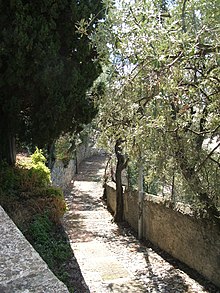music.wikisort.org - Composition_musicale
Crêuza de mä (en français : Sentier de mer) est le treizième album du chanteur italien Fabrizio De André paru en chez la maison de disques Ricordi. Cet album, entièrement écrit en ligurien, est considéré par la critique comme l'un des plus importants des années 1980 en Italie.[réf. nécessaire]
Crêuza de mä
Une Crêuza de mä, un sentier de mer à Sant'Ilario, quartier de Gênes.
| Sortie | |
|---|---|
| Durée | 33 min 29 s |
| Genre | Chanson italienne, pop |
| Producteur | Mauro Pagani et Fabrizio De André |
| Label | Ricordi |
Albums de Fabrizio De André
Titres de l'album
Les textes et les musiques sont de Fabrizio De André et Mauro Pagani :
Influence
La yole de Bantry de la ville de Gênes a choisi comme nom le titre de la chanson Crêuza de mä.
- Portail de la musique
- Portail de l’Italie
На других языках
[de] Crêuza de mä
Crêuza de mä ist ein 1984 von dem italienischen Cantautore Fabrizio De André aufgenommenes Studio-Album. Sämtliche Lieder sind im ligurischen Dialekt von De Andrés Heimatstadt Genua gesungen. Crêuza de mä ist die Bezeichnung für die zum Meer führenden gewundenen und von Natursteinmauern gesäumten Wege in Ligurien.[en] Crêuza de mä
Crêuza de mä (pronounced [ˈkɾøːza de ˈmaː];[lower-alpha 1] "Muletrack by the sea")[lower-alpha 2] is the eleventh studio album by Fabrizio De André, entirely sung in the Ligurian language, more specifically in the dialect of Genoa.[2] All the songs were written by De André and Mauro Pagani, with all lyrics by the former and music mostly by the latter; in a 2011 interview within the documentary DVD series Dentro Faber ("Inside Faber" [i.e. De André]), about De André's life and works, Pagani stated that his job on the album was to create melodies and arrangements for De André's already complete lyrics, on the basis of some "over-simplified" melodic ideas by the Genoese songwriter. Halfway through the album sessions, responding to Pagani's repeated concerns that the lyrics would be incomprehensible outside of Genoa,[3] De André reassured his friend by telling him that his music was so good that even Sicilians would get the meaning of the songs without understanding a single word.[4] However, full Italian translations of the lyrics (by De André himself) were included in the album's liner notes. The album was seen by Italian reviewers at the time as a milestone of Eighties music and of world music in general. David Byrne, talking to Rolling Stone, named the album as one of the most important releases of the decade,[5] and the Italian edition of Rolling Stone ranked it fourth in its 2012 "List of the 100 Best-Ever Italian Albums", published on its 100th Italian issue.- [fr] Crêuza de mä
Текст в блоке "Читать" взят с сайта "Википедия" и доступен по лицензии Creative Commons Attribution-ShareAlike; в отдельных случаях могут действовать дополнительные условия.
Другой контент может иметь иную лицензию. Перед использованием материалов сайта WikiSort.org внимательно изучите правила лицензирования конкретных элементов наполнения сайта.
Другой контент может иметь иную лицензию. Перед использованием материалов сайта WikiSort.org внимательно изучите правила лицензирования конкретных элементов наполнения сайта.
2019-2025
WikiSort.org - проект по пересортировке и дополнению контента Википедии
WikiSort.org - проект по пересортировке и дополнению контента Википедии
